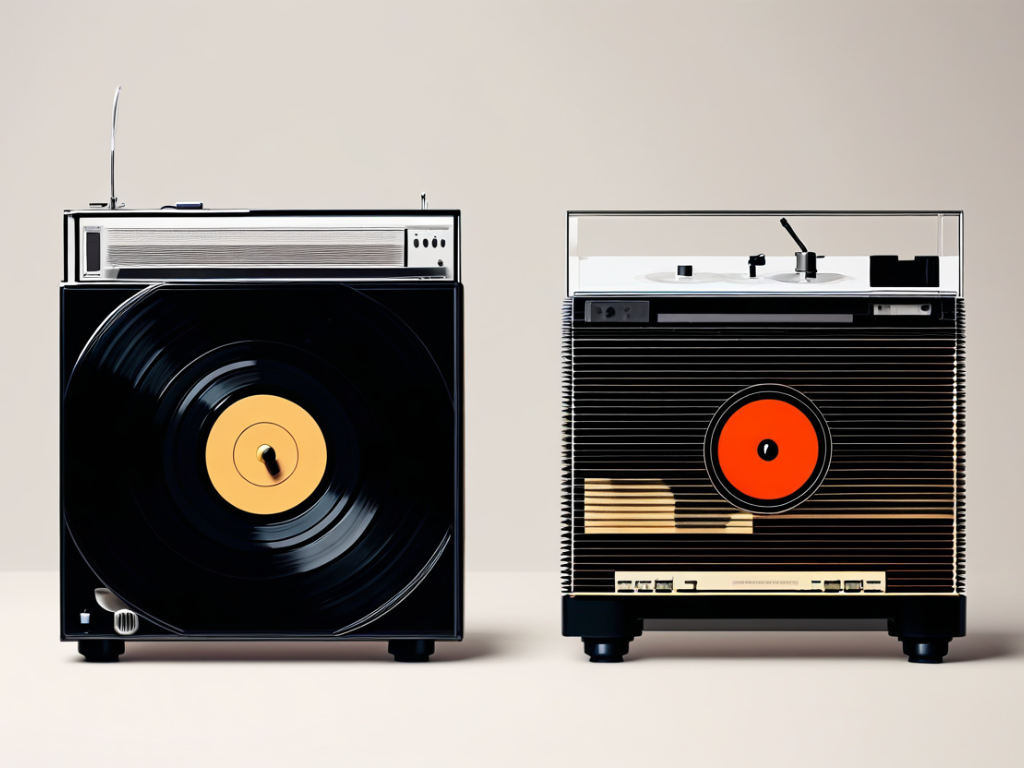Music players have undergone a remarkable evolution over the years, transforming the way we listen to our favorite tunes. From the warm crackle of vinyl records to the convenience of streaming services, each era has brought with it new possibilities and experiences. Let’s take a journey through the history of music players, exploring how technology has shaped the way we enjoy music from the days of analog to the digital age.
In this article you will find:
- 1. Vinyl Records: The Analog Era
- 2. Cassette Tapes and Walkmans: The Portable Revolution
- 3. CDs and Discmans: The Digital Age Begins
- 4. MP3 Players and iPods: The Era of Digital Convenience
- 5. Streaming Services and High-Resolution Audio: The Future of Music Playback
1. Vinyl Records: The Analog Era
Before the advent of digital music, vinyl records reigned supreme as the primary medium for music playback. The rich sound of a vinyl record spinning on a turntable, accompanied by the iconic pops and crackles, offered a unique listening experience that captivated music enthusiasts. The warmth and depth of sound produced by vinyl records created an emotional connection between the listener and the music.
Despite the rise of digital music formats, vinyl records have seen a resurgence in recent years, appealing to audiophiles who appreciate the ritualistic nature of vinyl playback and the superior sound quality it can provide.
2. Cassette Tapes and Walkmans: The Portable Revolution
With the introduction of cassette tapes and portable players like the Sony Walkman in the 1980s, music lovers gained the ability to take their favorite tunes on the go. The compact size and lightweight design of cassette players revolutionized the way people consumed music, enabling them to create personalized playlists and listen to music anywhere, anytime.
The emergence of cassette tapes marked a shift towards greater convenience and portability in music players, setting the stage for the digital revolution that would soon follow.
3. CDs and Discmans: The Digital Age Begins
The introduction of compact discs (CDs) in the 1990s signaled a major leap forward in music technology. CDs offered improved sound quality, durability, and the ability to jump between tracks with ease. Portable CD players, such as the iconic Sony Discman, made it possible for listeners to enjoy their favorite albums on the move.

CDs represented the transition from analog to digital music playback, paving the way for the development of digital audio formats and devices that would come to dominate the music industry in the 21st century.
4. MP3 Players and iPods: The Era of Digital Convenience
The rise of digital music formats, such as MP3, revolutionized the way we store and listen to music. MP3 players, led by Apple’s iconic iPod, offered a vast library of music at our fingertips, with the ability to easily create playlists, shuffle songs, and carry thousands of tracks in a pocket-sized device.
The convenience and portability of MP3 players transformed the music listening experience, making it more personalized and accessible than ever before. The iPod, with its sleek design and user-friendly interface, became synonymous with the digital music revolution.
5. Streaming Services and High-Resolution Audio: The Future of Music Playback
In today’s digital age, streaming services have become the primary mode of music consumption for many listeners. Platforms like Spotify, Apple Music, and Tidal offer vast catalogs of music that can be accessed instantly across a variety of devices.
Additionally, the rise of high-resolution audio has catered to audiophiles seeking studio-quality sound reproduction. Devices capable of playing high-resolution audio files, paired with premium headphones or speakers, deliver an unparalleled listening experience that rivals traditional analog formats.
As technology continues to advance, the future of music players holds exciting possibilities, from immersive spatial audio to personalized music recommendations driven by artificial intelligence.
Through the evolution of music players, one thing remains constant: the universal love for music and the profound impact it has on our lives. Whether you prefer the warm nostalgia of vinyl records or the digital convenience of streaming services, the journey of music playback is a testament to the enduring power of sound and the endless possibilities it holds.

